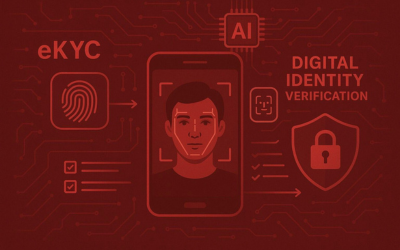Know Your Employee (KYE): Trust Starts Here

Know Your Employee (KYE): Building Trust Through Verification
In today’s digital and highly regulated work environment, organizations face rising challenges in hiring the right talent while ensuring security, compliance, and long-term reliability. One critical process that is helping businesses navigate this terrain is Know Your Employee (KYE) — a structured way to verify, assess, and build trust in your workforce. While many are familiar with KYC (Know Your Customer), KYE is gaining prominence for its role in corporate risk mitigation and fraud prevention.
As hybrid and remote workforces expand, HR teams and
compliance officers are relying on advanced technologies, such as AI and OCR,
to streamline KYE processes without compromising on accuracy or candidate
experience. From identity checks to previous employment verifications, KYE
covers a range of measures essential to making informed hiring decisions.
Table of Contents
- What
is Know Your Employee (KYE)?
- Why is
KYE Important?
- Key
Components of a Robust KYE Process
- Benefits
of Implementing KYE
- How
KYE Differs From KYC
- Digital
Transformation in KYE Processes
- Common
Challenges in Employee Verification
- How
SprintVerify Enhances KYE for Organizations
- Frequently
Asked Questions (FAQ)
What is Know Your Employee (KYE)?
Know Your Employee (KYE) is a verification process used by
organizations to validate the identity, background, and credentials of
employees before and during their employment lifecycle. It is designed to
mitigate internal fraud, comply with legal standards, and foster a secure
workplace.
Why is KYE Important?
- It
helps in preventing employee-related frauds and insider threats.
- It
ensures that the hiring is done in compliance with government norms and
industry standards.
- It
reduces legal liability arising from hiring individuals with fake or
criminal backgrounds.
- It
enhances corporate reputation by maintaining a vetted and trustworthy
workforce.
Key Components of a Robust KYE Process
- Identity
Verification: Matching government-issued IDs to employee details.
- Address
Verification: Ensures the authenticity of the residential address
submitted.
- Educational
Background Check: Confirms degrees and certifications with the
institutions.
- Employment
History Check: Verifies past roles, tenure, and reasons for leaving.
- Criminal
Record Check: Screens for any pending or past criminal cases.
- Reference
Check: Involves talking to previous managers or colleagues.
- Social
Media and Digital Footprint Review: A subtle but growing part of
verification.
Benefits of Implementing KYE
- Reduces
Internal Threats: By identifying red flags early.
- Improves
Hiring Accuracy: Aligns candidate claims with actual records.
- Boosts
Organizational Compliance: Especially with data protection and
financial regulations.
- Builds
a Culture of Accountability: Employees are more cautious and
responsible.
- Enhances
Trust in Remote Hiring: Especially valuable post-COVID-19.
How KYE Differs From KYC
- KYC
focuses on verifying customers while KYE is about employees.
- KYE
goes beyond basic ID verification to include employment history,
references, and criminal checks.
- KYC is
often one-time; KYE can be continuous, especially in sensitive roles.
- KYE
helps manage internal risks, whereas KYC helps prevent external fraud.
Digital Transformation in KYE Processes
- Organizations
are now integrating AI-powered
identity verification for real-time employee authentication.
- OCR
and AI technologies reduce manual errors in document reading and
cross-checking.
- Digital
onboarding workflows powered by eKYC
tools make the verification process smoother and faster.
- KYE
systems are becoming compatible with broader frameworks like KYB
(Know Your Business) and DPDP
Act compliance.
Common Challenges in Employee Verification
- Fake
Documentation: Counterfeit educational or work certificates.
- Delayed
Responses: Reference and employer checks can take time.
- Data
Privacy Concerns: Mishandling sensitive employee information.
- Lack
of Standardization: Different companies follow different verification
protocols.
- Insider
Threats Not Detected: Basic checks might miss behavioral red flags.
How SprintVerify Enhances KYE for Organizations
- Offers
easy
identity verification using secure and scalable technology.
- Enables
swift employee
background verification through reliable data partners.
- Uses
AI to detect anomalies and prevent fraudulent
activities early in the hiring process.
- Seamlessly
integrates with HRMS systems for continuous KYE compliance.
- Supports
specialized industries with custom modules such as CANDY
framework for evaluating digital behavior of candidates.
Frequently Asked Questions (FAQ)
- Is
KYE mandatory for all organizations?
While not legally mandatory across all sectors, it is strongly recommended, especially in finance, IT, and healthcare industries.
- How
often should KYE be done?
At the time of onboarding and at regular intervals during employment for sensitive roles.
- What’s
the difference between KYE and employee background verification?
Background verification is a part of KYE. KYE is a broader, continuous risk management approach.
- Does
KYE violate employee privacy?
No, if conducted within the legal framework and with employee consent. Organizations must follow data protection norms.
- Can
small businesses implement KYE?
Yes, especially with digital platforms like SprintVerify that offer scalable and affordable solutions.
To learn more about streamlining your employee verification
process, visit SprintVerify’s Employee Background Verification API.






